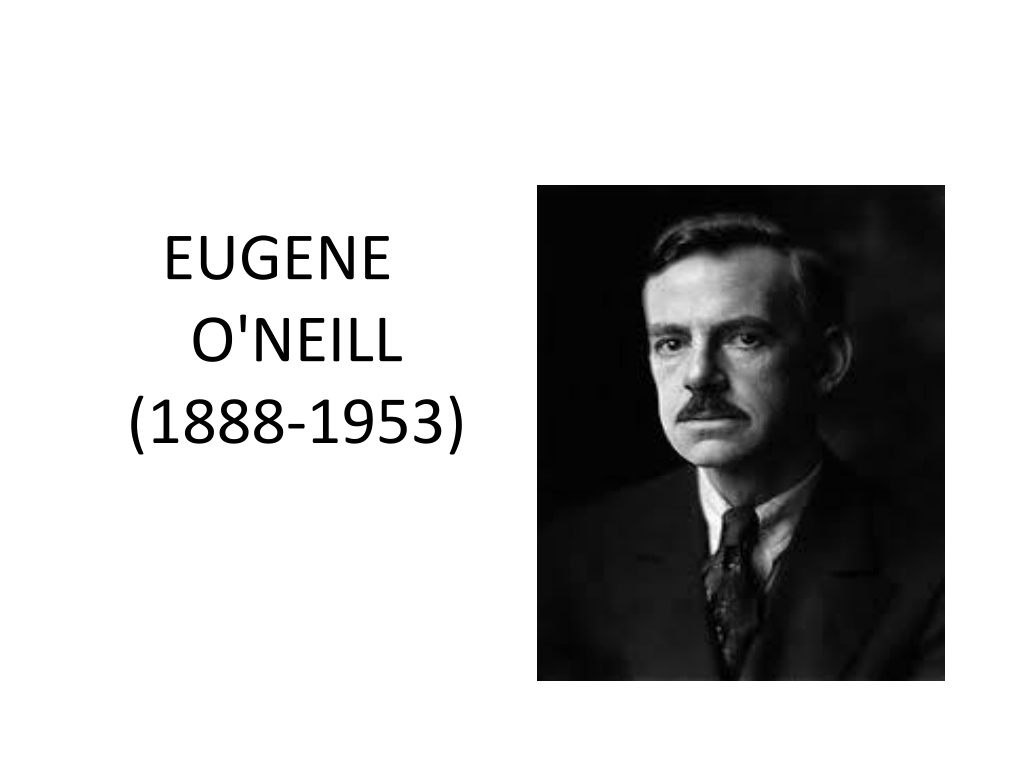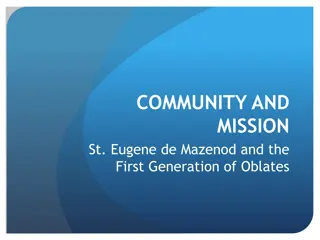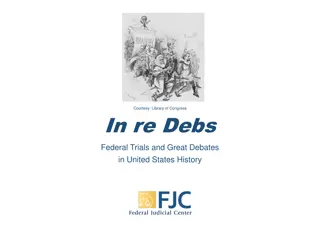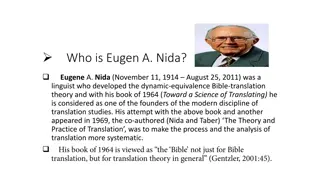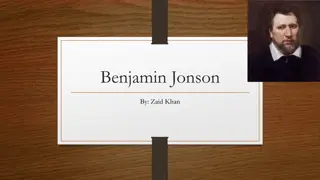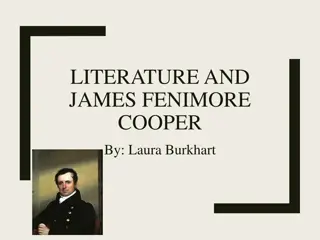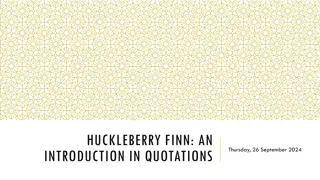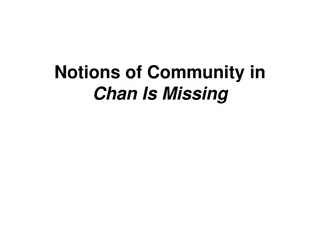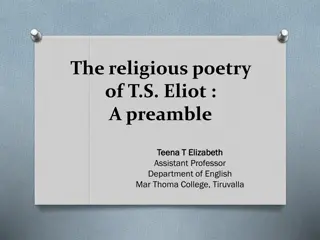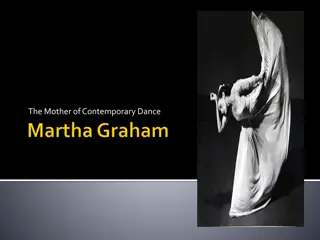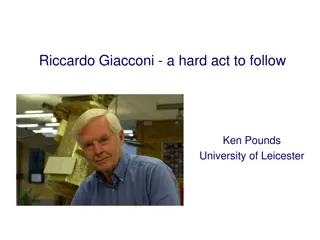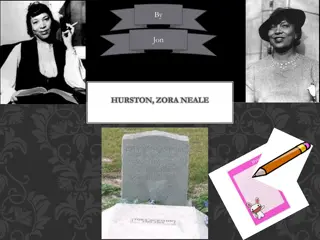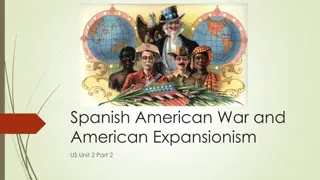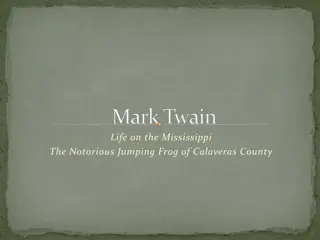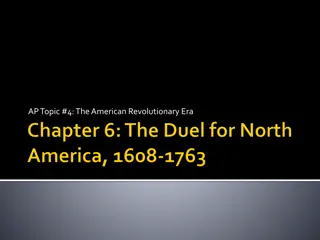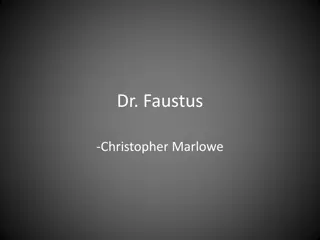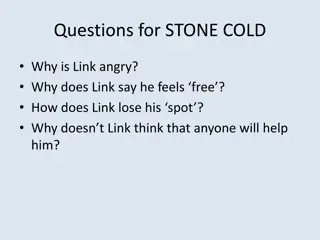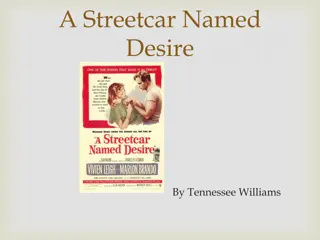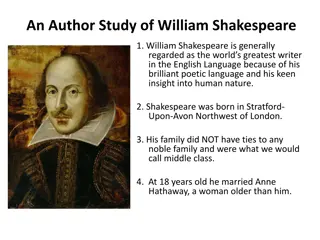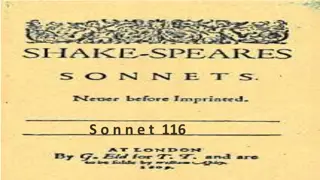Eugene O'Neill - The Pioneering American Playwright
Eugene O'Neill (1888-1953) was a trailblazing American playwright, renowned for his exploration of the human condition, spirituality, and existential themes in over 60 plays. His works delved into the relationship between man and God, the struggle for belonging and purpose, and the search for meaning in a world filled with loneliness and existential exile. O'Neill's masterpieces, including "The Iceman Cometh" and "Long Day's Journey into Night," continue to be celebrated as dramatic landmarks in the history of American theater.
Download Presentation

Please find below an Image/Link to download the presentation.
The content on the website is provided AS IS for your information and personal use only. It may not be sold, licensed, or shared on other websites without obtaining consent from the author. Download presentation by click this link. If you encounter any issues during the download, it is possible that the publisher has removed the file from their server.
E N D
Presentation Transcript
EUGENE O'NEILL (1888-1953)
the first internationally significant American playwright more than 60 plays 4 Pulitzer Prizes Nobel Prize in literature
Most modern plays are concerned with the relation between man and man, but that does not interest me at all. I am interested only in the relationship between man and God. not presence of God that interested O Neill but his absence concerned with the death of the old grounds for belief
Fundamental problem in his plays relation of the human being to something outside himself to which he can belong and in which he can ground himself and find purpose something that saves him from being lonely, lost, an existential exile - or as his characters put it a stranger in a strange land
Beyond the Horizon (1920) - acknowledged as the leading American playwright of his day Other plays: Anna Christie, 1920 - Pulitzer Prize, 1922 The Hairy Ape, 1922 Desire Under the Elms, 1924
Devoted to experimental writing style in The Great God Brown, 1926 - use of symbolic masks in Strange Interlude, 1928 (Pulitzer Prize) a dramatic form of stream-of-consciousness In Mourning Becomes Electra, 1931 - Oresteia of Aeschylus retold as a story of the Civil War
after Days Without End (1934) - theatrical silence The Iceman Cometh (1946) - the last play produced during his lifetime died in 1953 the critical consensus his best work plays from the 1920s view transformed in 1956 with the premiere of Long Day s Journey into Night
a posthumous Pulitzer Prize considered a dramatic masterpiece
the title - the importance of time one long day in August in 1912 descent into darkness the symbolism of the fog
directly autobiographical a play of sorrow, written in tears and blood coming to terms with his present by confronting the past
the Tyrone family: James Tyrone, a former matinee idol, Mary Tyrone, a nervous sickly woman addicted to morphine, older son Jamie, a hard-drinking cynic, younger son Edmund, who has literary aspirations and suffers from tuberculosis
obvious from the start that something has happened in the past that haunts the Tyrones, communicated indirectly, i.e. when Mary teases her husband for snoring, Jamie quickly picks up on the fact that she couldn t sleep- at his uneasy, probing look , Mary becomes anxious and asks him Why are you staring Jamie? Is my hair coming down? It s hard for me to do it up properly now. My eyes are getting so bad and I never can find my glasses. At this, Jamie looks away guiltily and says, Your hair s all right, Mama. I was only thinking how well you look
What are they hiding? clues to this mystery revealed gradually Act 3: Mary a dope addict The past is the present, isn t it? ... It s the future too. We all try to lie out of that but life won t let us.
Jessica Lange as Mary Tyrone Broadway, 2016
to escape the pain she cannot bear, she withdraws into a happier past her disheveled appearance parallels the disintegration: firstly dressed elegantly, hair arranged with fastidious care , her voice soft and attractive by the final scene, her regression is complete - elegant dress replaced by a dressing gown worn over her nightdress, hair is in pigtails, she is paler than ever, and her eyes, now enormous, glisten like polished black jewels
Katherine Hepburn Long Day's Journey into Night (film adaptation, 1962)
the isolation of others members of the family and disintegration of the family unit a study of lives in disintegration, people without something to give shape and significance to their lives
their ideal moments as the play builds to its climax: for James, its apex in 1874 - That young man is playing Othello better than I ever did! for Mary, her own lost innocence, associated with her convent days and her desire to be a nun for Jamie, not ideal realized but lost - the time when he discovered his mother in the act with a hypo
Michael Shannon as Jamie Tyrone Broadway, New York, 2016.
Ideal time for Edmund: I became drunk with the beauty and singing rhythm of it, and for a moment I lost myself -- actually lost my life. I was set free! I dissolved in the sea, became white sails and flying spray, became beauty and rhythm, became moonlight and the ship and the high dim-starred sky! I belonged, without past or future, within peace and unity and a wild joy, within something greater than my own life, or the life of Man, to Life itself! To God, if you want to put it that way.
Edmund is an exercise in self-portraiture life tormented and alienated from family: It was a great mistake, my being born a man. I would have been much more successful as a sea-gull or a fish , Edmund observes , As it is I will always be a stranger who never feels at home, who must always be a little in love with death!
divided, disintegrated people - they are at odds with themselves, with each other expressed in the words they use and their conversations - lash out at each other in an endless round of guilt-accusation-remorse- forgiveness-and-counterattack
the condition of the Tyrones and human condition in O Neil s plays the secret of joy, professed only for a moment, before and after there is only waste and exile in act 4 the possibility of hope potential breakthrough unrealized after Mary s entrance nothing has changed
Like Faulkner, ONeill believed that the past is the present like Faulkner, the family as an elaborate web of blame and dependence - the Tyrones constantly accusing each other, but also relying on each other to bolster the image of themselves through sharing their memories and illusions
Sources: From Puritanism to Postmodernism Norton Anthology: Eugene O Neil Radojka Vuk evi , Perspectives on American Literature https://www.youtube.com/watch?v=ADtcMi2 Wwg0
